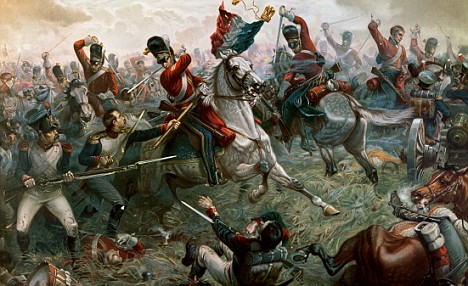As it’s the two-hundredth anniversary of the Battle of Waterloo, I thought I’d share this Pre-Raphaelite tidbit from the twenty-one-year-old Dante Gabriel Rossetti.
In the autumn of 1849, he and William Holman Hunt took a holiday to the continent together. Rossetti journaled the experience in verse which he duly sent to his brother, William Michael, back in London. Between sniggering in art galleries and noticing pretty girls (French ones weren’t as nice as English ones, naturally), the PR Brothers took in the usual famous attractions, including the site of the Battle of Waterloo. Here’s what Rossetti thought of it:
On the Field of Waterloo.
So then, the name which travels side by side
With English life from childhood—Waterloo,
Means this. The sun is setting. “Their strife grew
Till the sunset, and ended,” says our guide.
It lacked the “chord” by stage-use sanctified,
Yet I believe one should have thrilled. For me,
I grinned not, and ’twas something:—certainly
These held their point, and did not turn but died:
So much is very well. “Under each span
“Of these ploughed fields” (’tis the guide still) “there rot
Three nations’ slain, a thousand-thousandfold.”
Am I to weep? Good sirs, the earth is old:
Of the whole earth there is no single spot
But hath among its dust the dust of man.
Oh dear. But he does have a point. And then, in a letter to William at home:
One of the great nuisances of this place, as also at Waterloo, is the plague of guides from which there is no escape. The one we had at Waterloo completely baulked me of all the sonnets I had promised myself; so that all I accomplished was the embryo bottled up in the preceding column. Between you and me, William, Waterloo is simply a bore.

